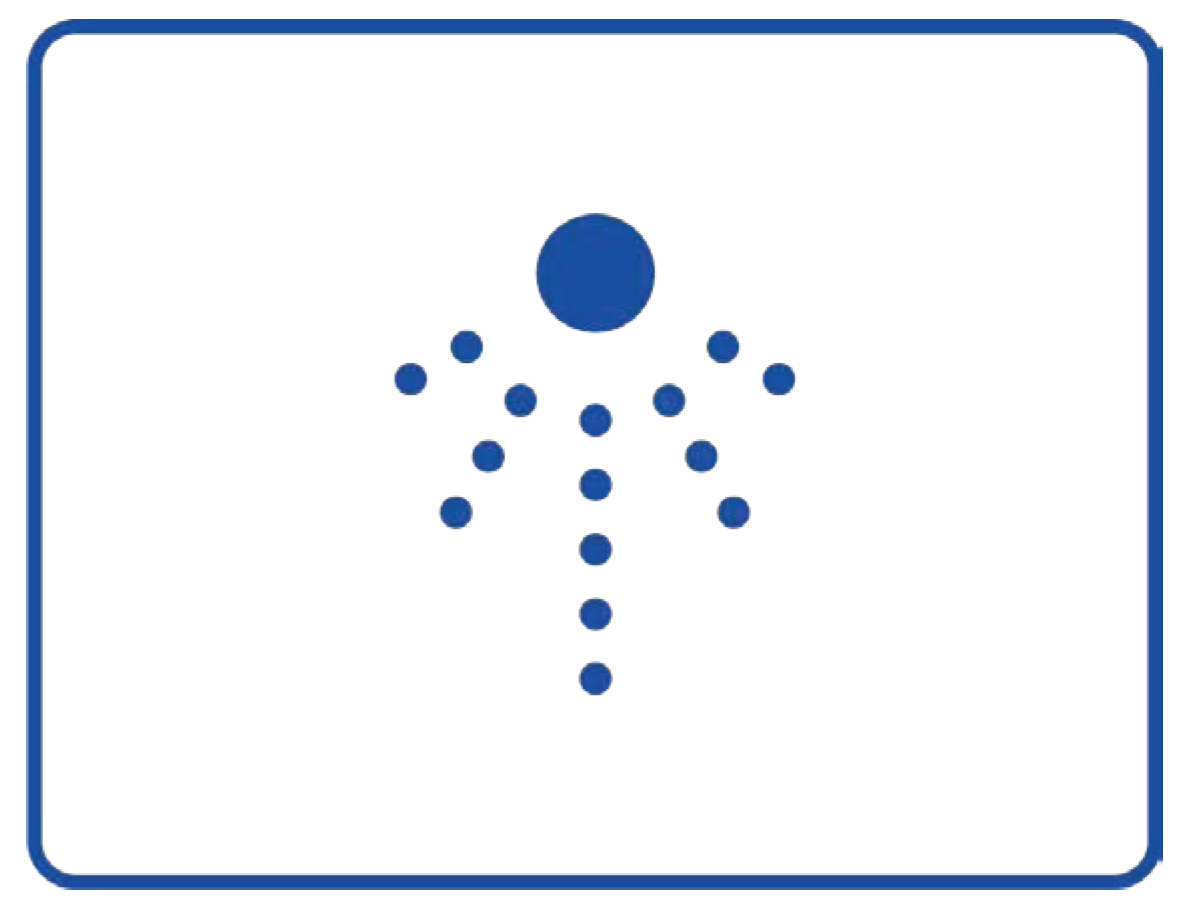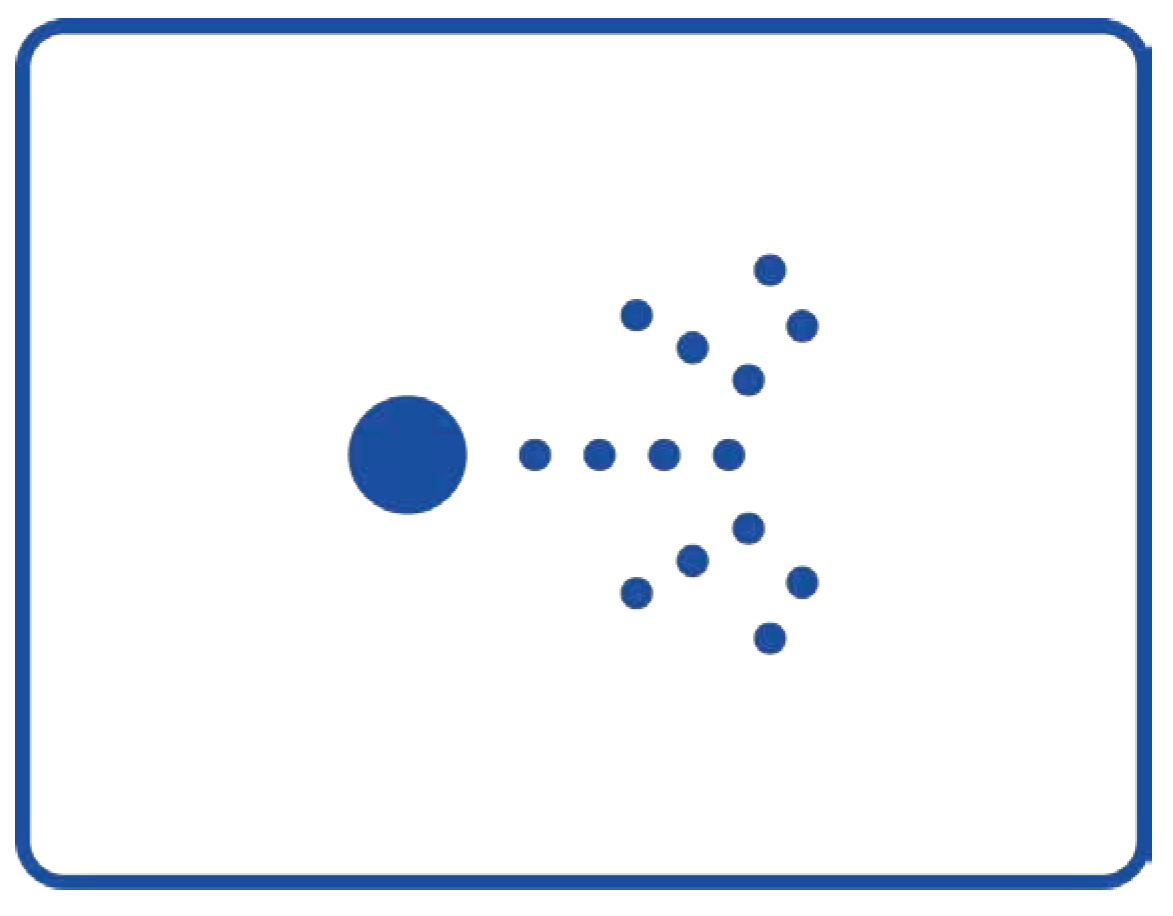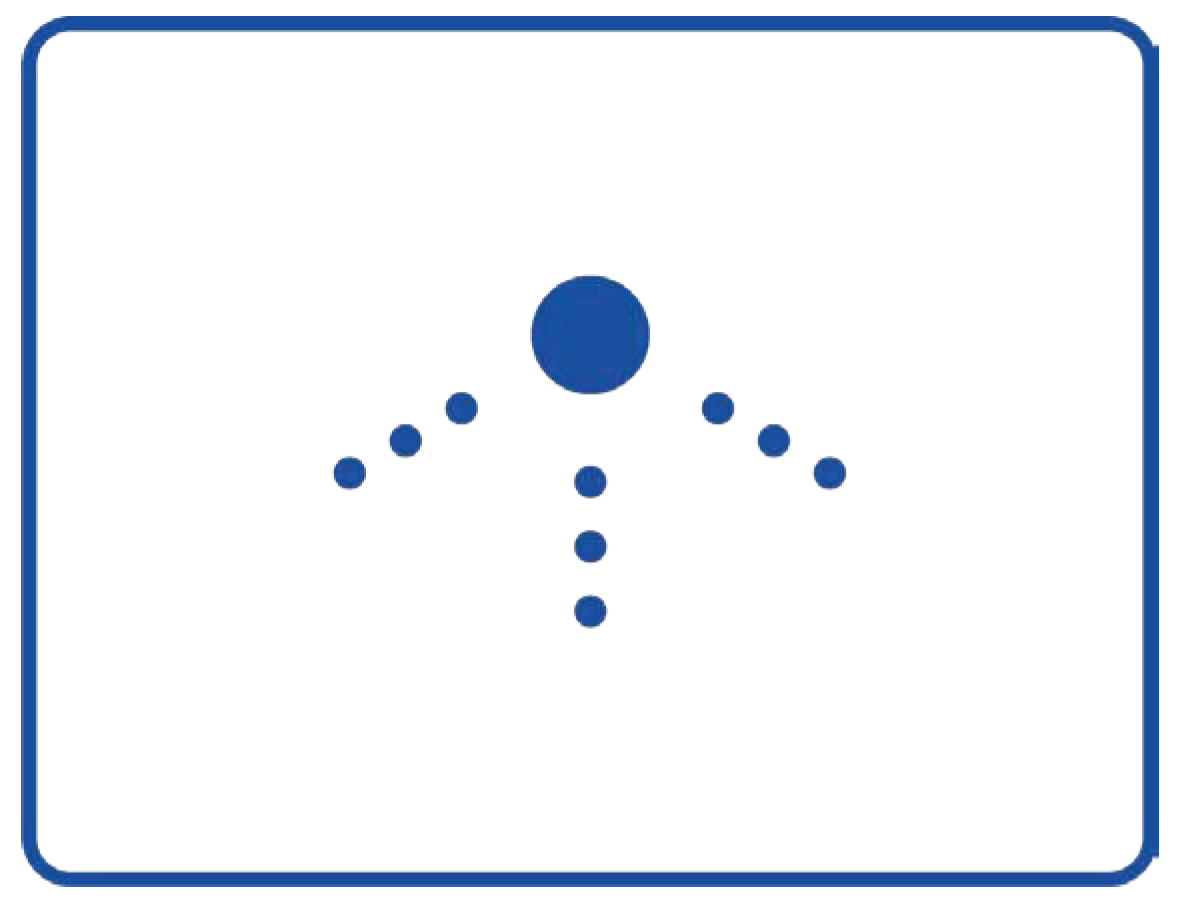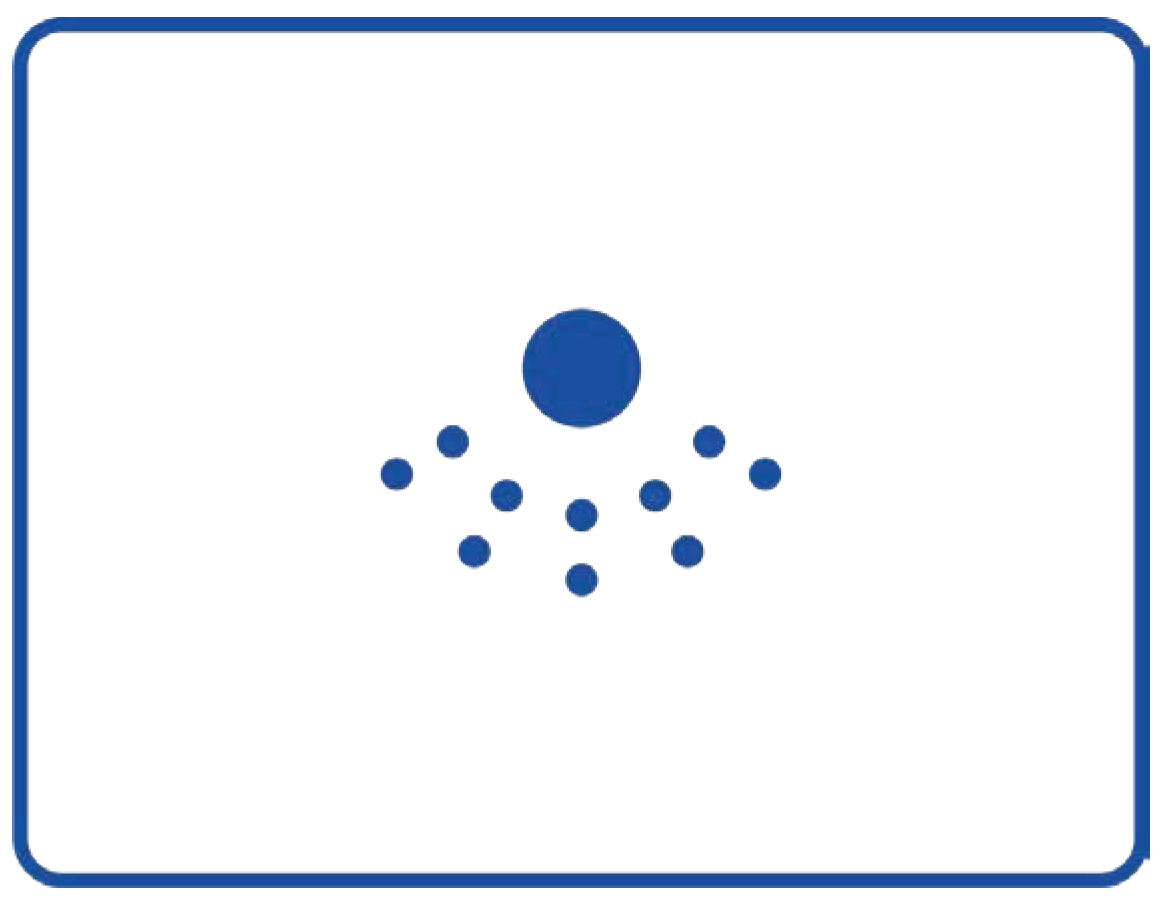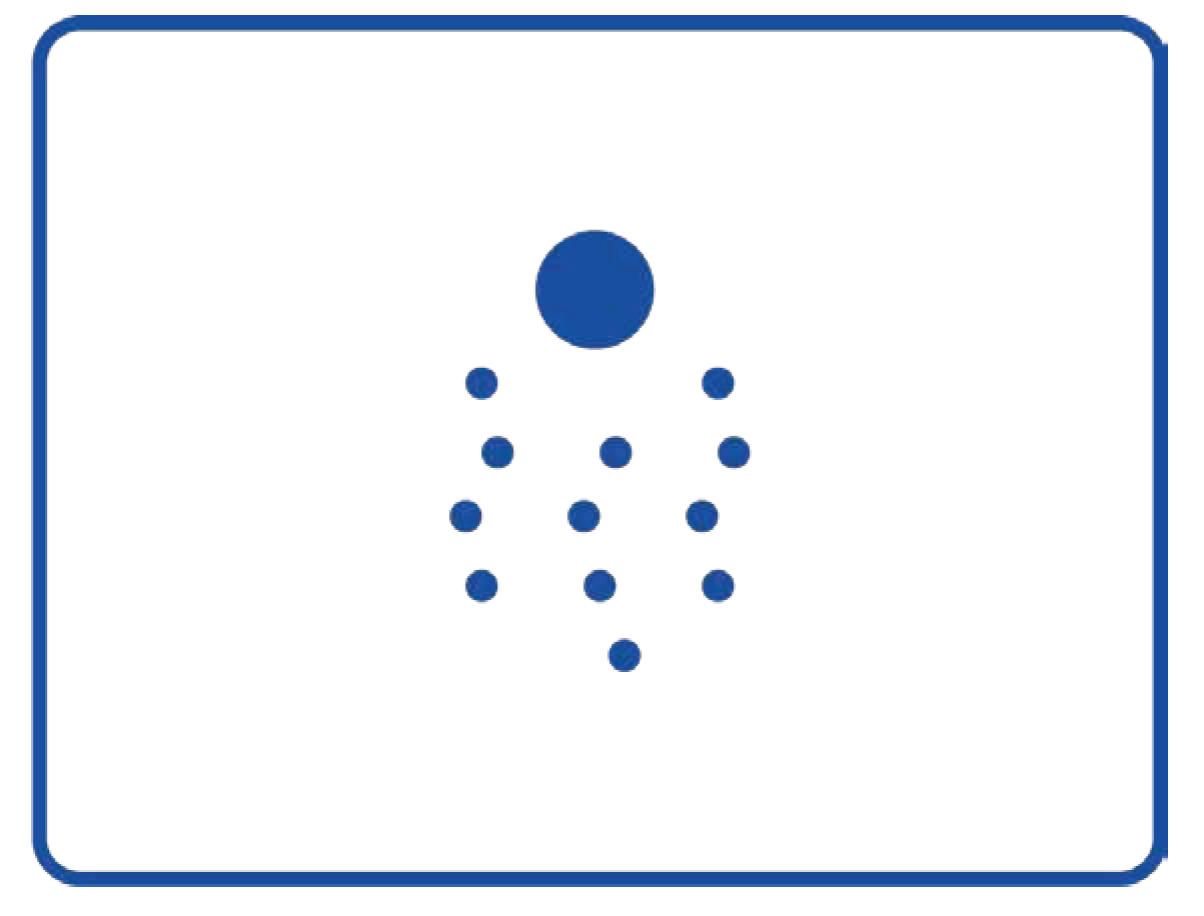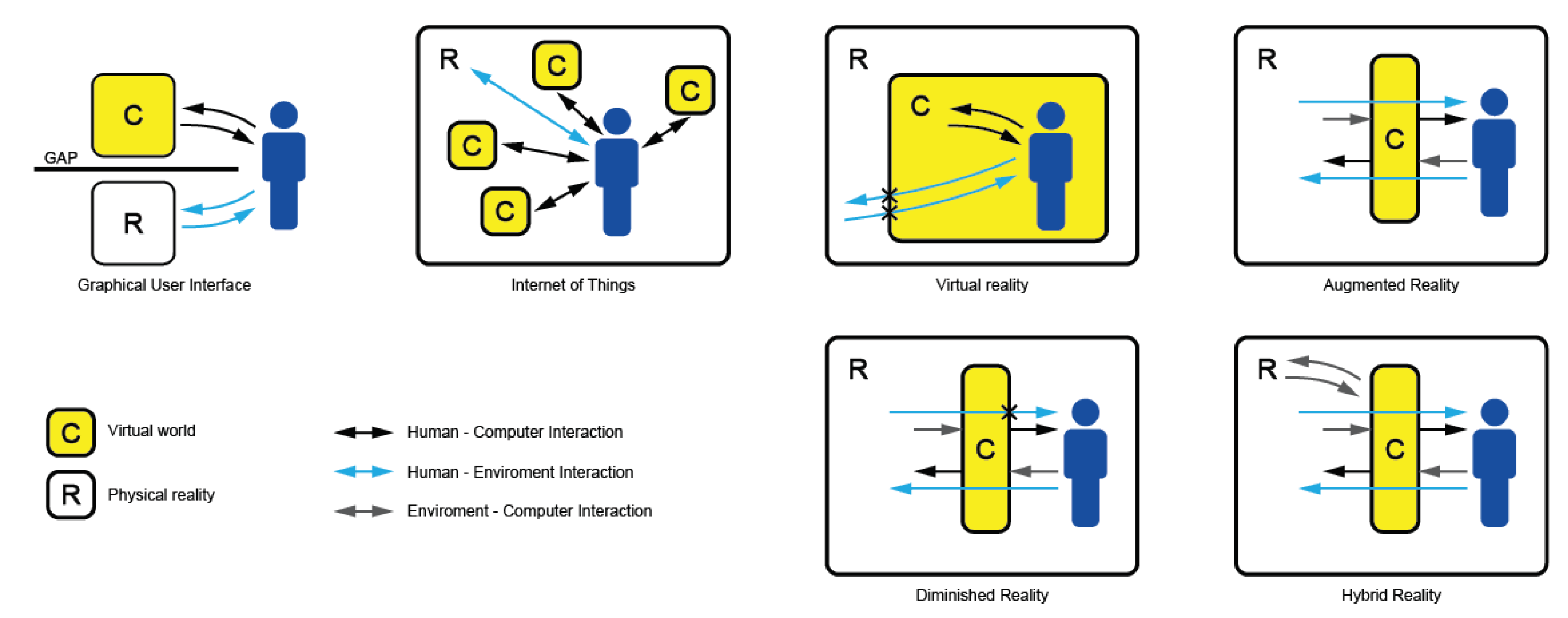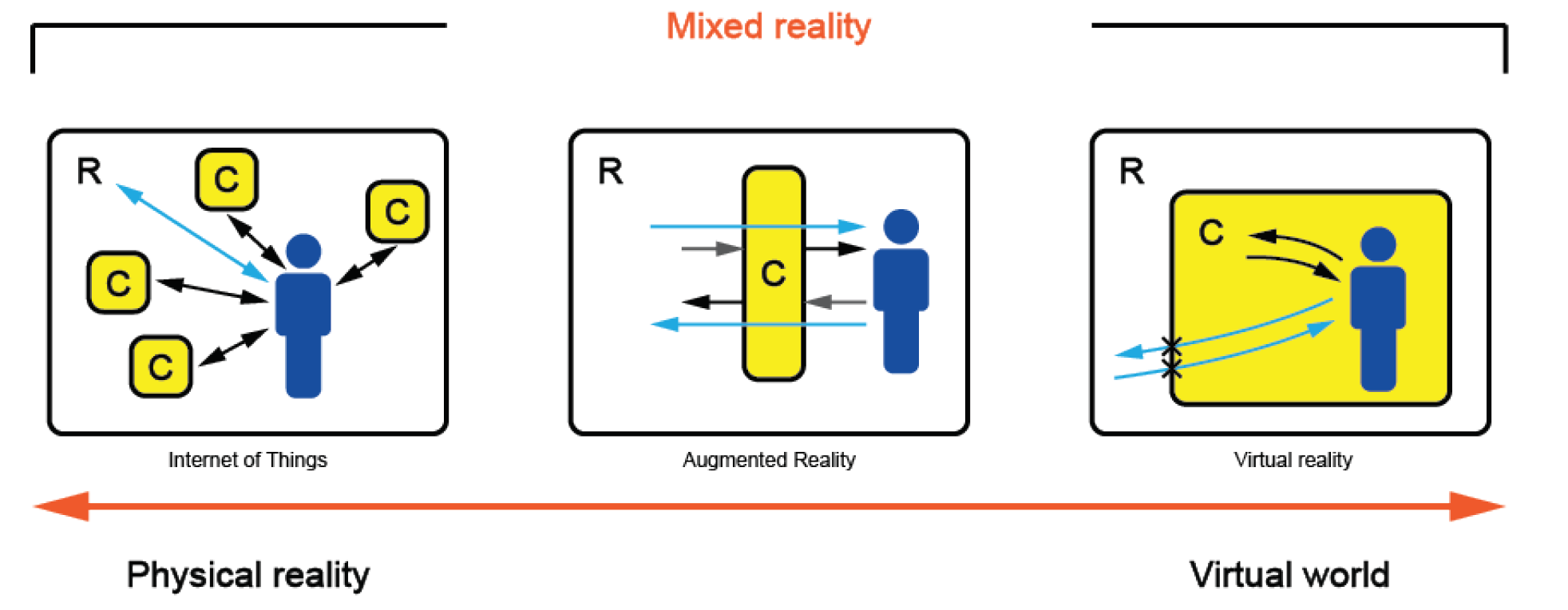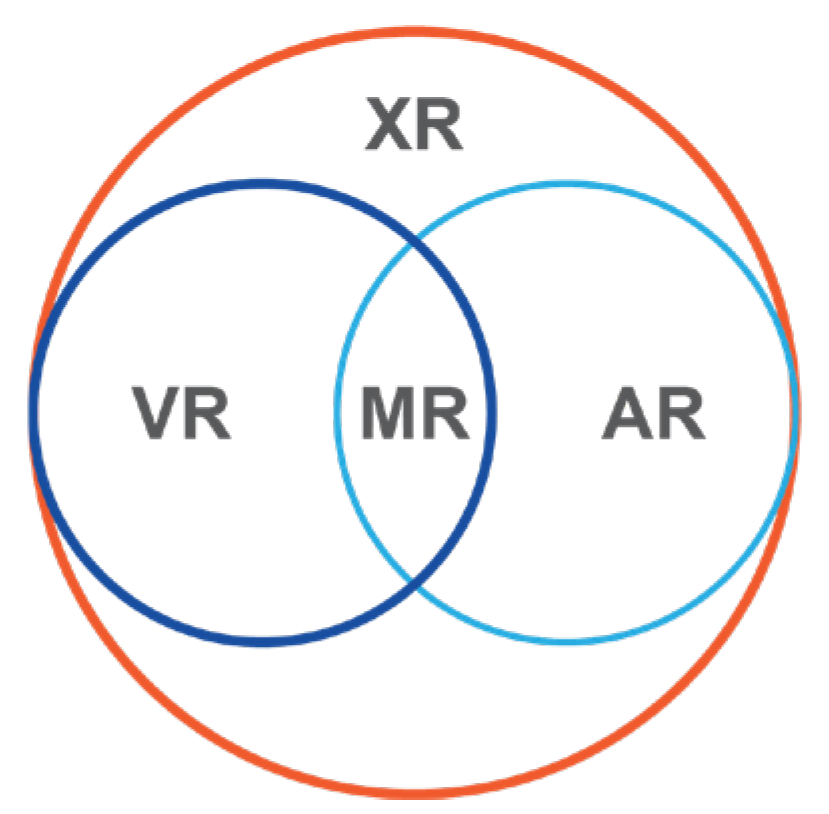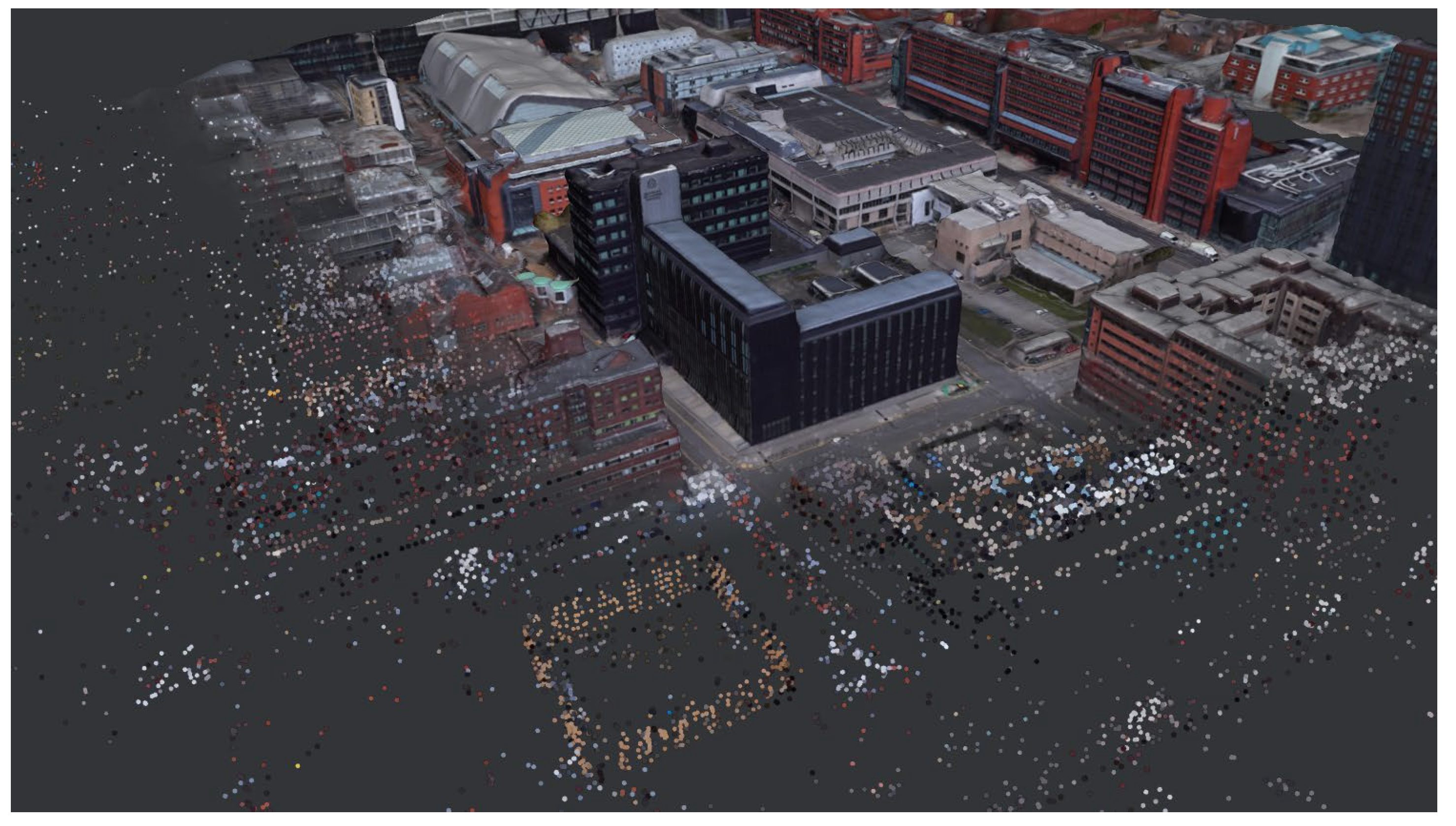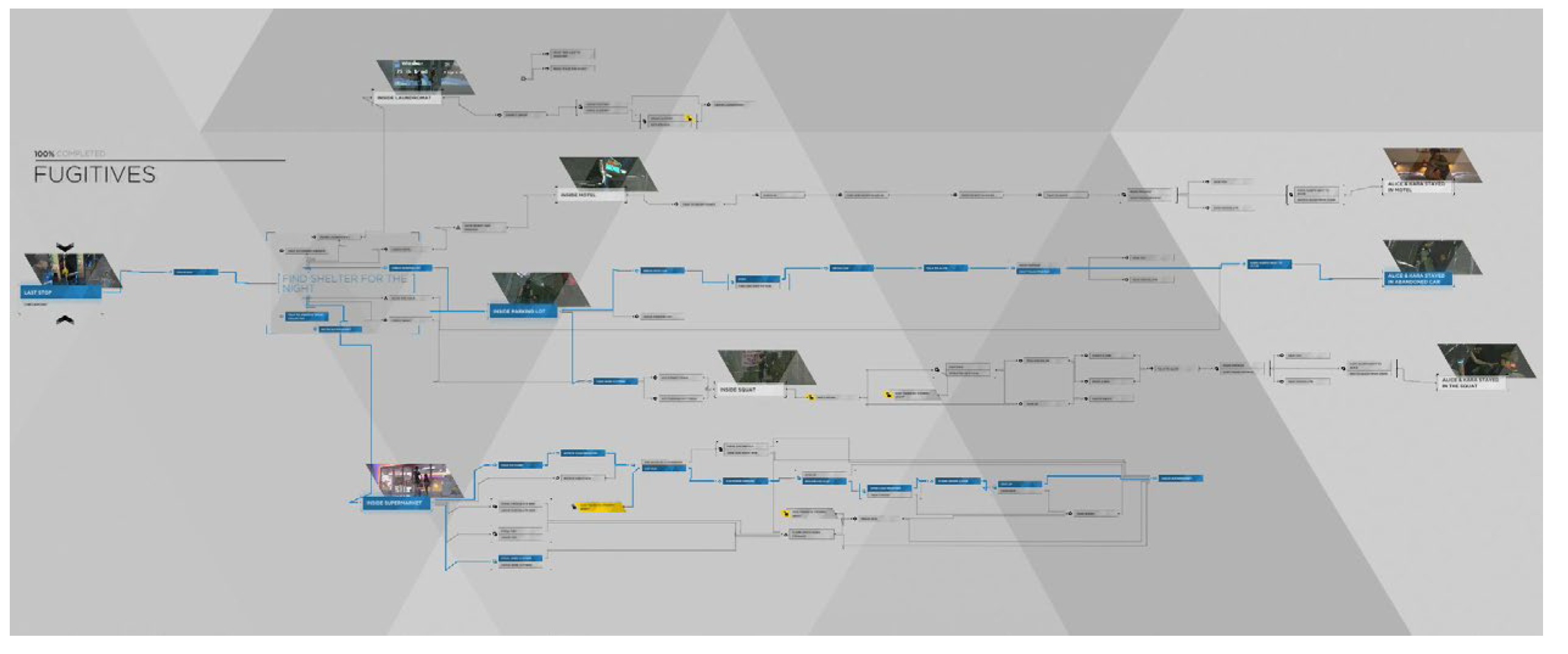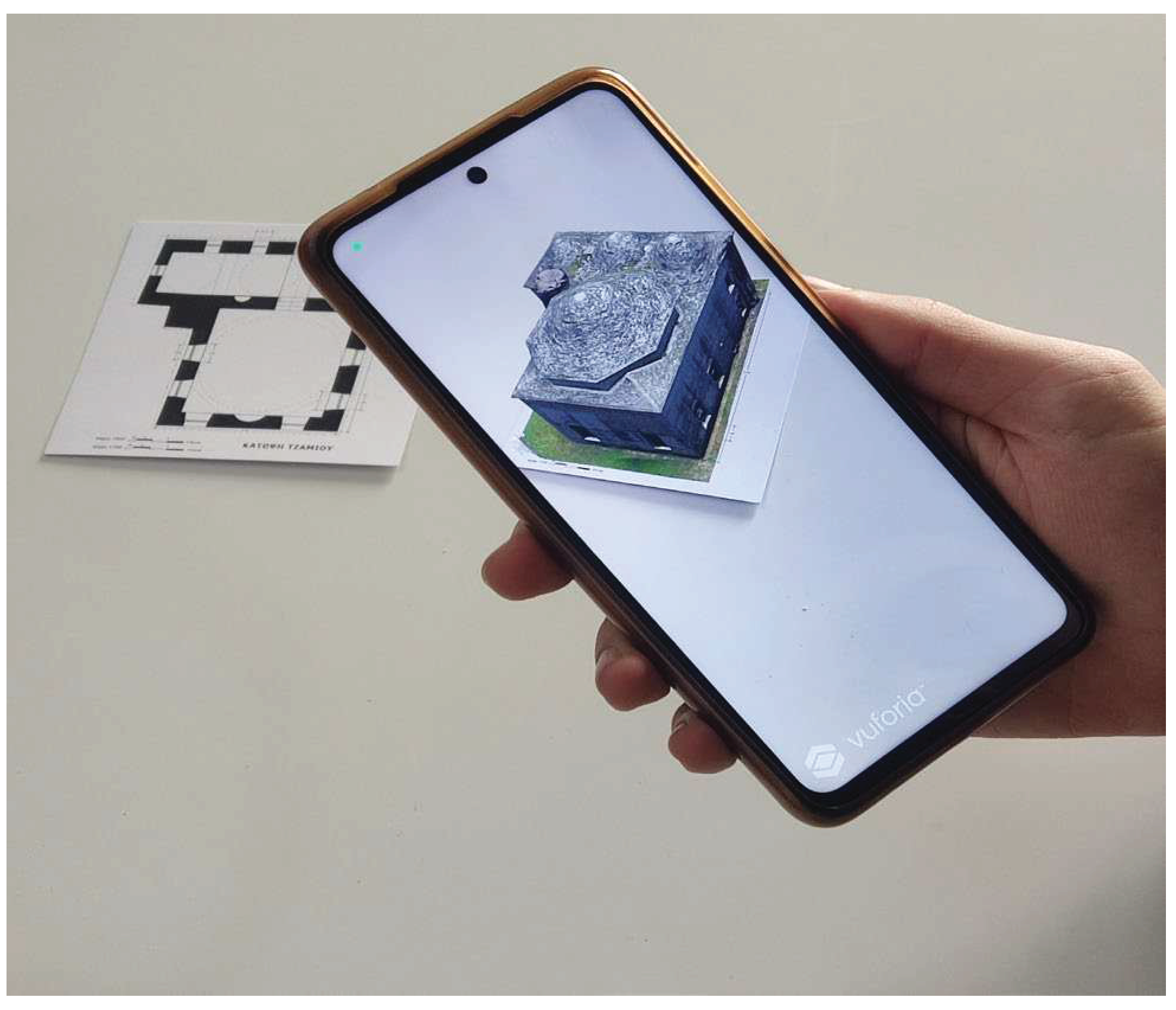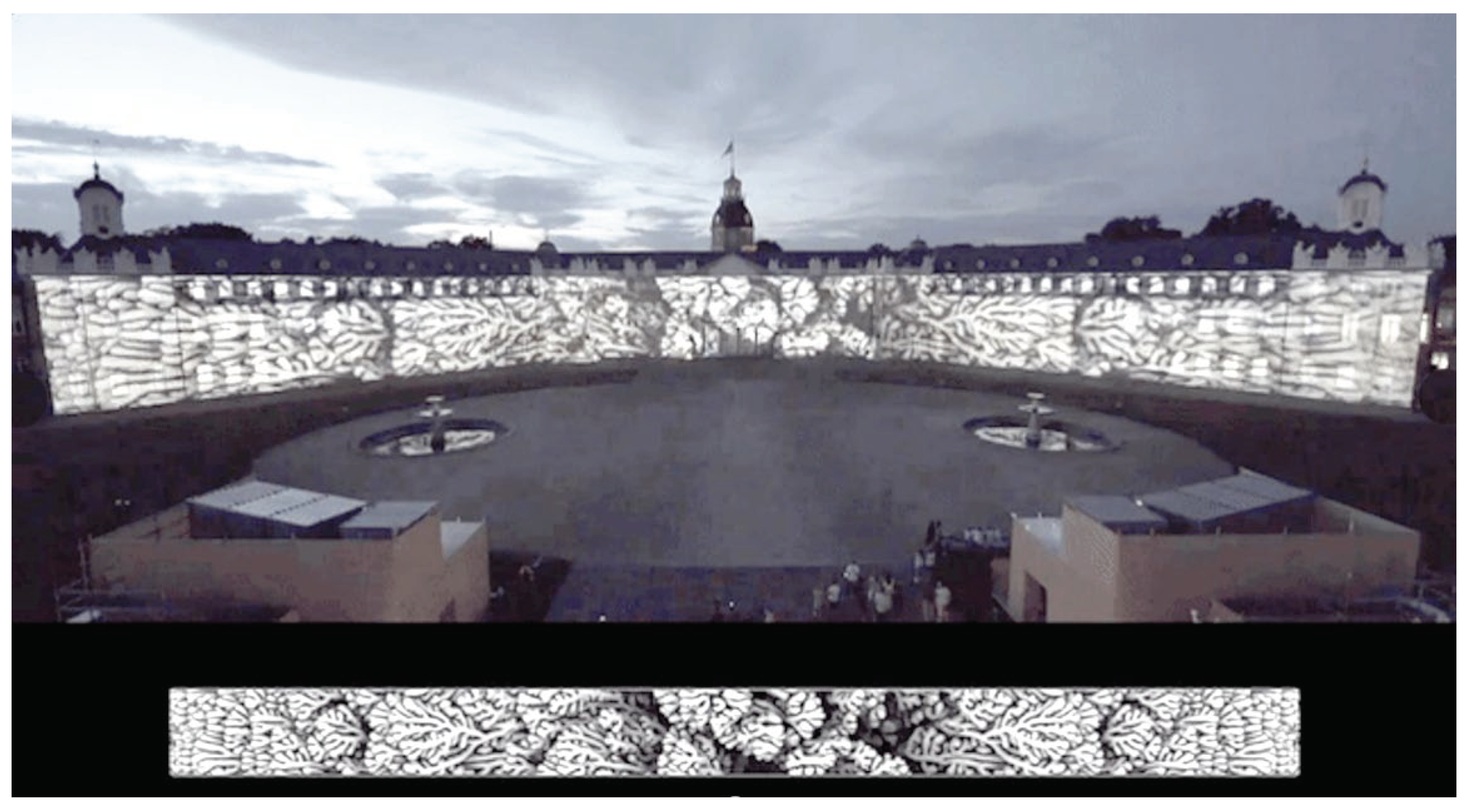1. Introduction: Experience in the Virtual Environment
In the virtual setting, it is mostly common to interact with visual information aiming for the maximum impact in the shortest period. As the level of immersion increases especially through the extensive use of colorful images and vibrant sounds, other tactile senses of experiencing the world such as smell, taste and touch are set aside. This effect has a clear impact on notions of perception commonly described by psychology. In consequence of its broader implications, this observation causes a shift on how the built environment is created and communicated mainly through digital applications and online communication modes, rather than analogue production means and direct experience with the hardcopies, scaled models, and, not least, the actual edifice. Architectural experience happens through the screen rather than physically, and in turn architecture both as production practice and intellectual discourse is increasingly concentrated into these dematerialized media.
Given the impact of virtual environments upon the architectural work, this study attempts to draw possible links between the experience of virtual space and that of the physical one, then to integrate critical characteristics of virtual space into the broader architectural context. Initially, an analysis is made on the technology associated with virtual environments from the user’s viewpoint. The standard phenomenological model of perception through the five senses is employed as a basis by which to set the categories into which virtual reality technologies are divided and classified. It has been deemed necessary to gain a thorough understanding of the modes of interaction being activated by which artificial space in any of its forms is experienced. It has also been critical to refer to the historical aspects concerning virtual architecture, by making an emphasis on prevailing theories and philosophies about places intended for humans in the virtual setting. Related ideas include updates on the notion of technical images linked to digital composers and devices as outlined by media theorist Vilém Flusser and then Marcos Novak’s experimental translations of “Liquid Architecture,” studied alongside Janet Murray’s descriptions on the cyber narrative culture. Related definitions on the notion of "virtual architecture" offer information of an extended interdisciplinary framing by which to understand virtual spaces concerning how these are produced and accordingly their purpose also with regards to the physical space. Through typical examples and applications, the elements of virtual architecture are identified, along with the set of capabilities required to design at the intangible and the immaterial setting.
Following the above, this study prompts towards an interdisciplinary discussion regarding the relevance and the potential of virtual environments into creative thinking as they affect the field of architecture including any of the scientific implications that such influences beget. The research concludes by pointing at new possibilities to enrich architectural aims by appropriating aspects of virtual space design.
2. Operation and Use of Virtual Environment Technology
2.1. Human Sensory Perception
An increasing emphasis on visual contact being typical of the virtual setting experience causes to minimize the performance of other senses. As this remark also applies in the ways architecture is conceived, taught and assessed on the screen, concerns are voiced raising its consequences into the field of architecture. Respectively, Juhani Pallasmaa performs an analysis of the epistemology of the senses and then he attributes many of the pathologies of contemporary architecture to this phenomenon. As he claims, “architecture is the art of reconciliation between ourselves and the world, and this mediation takes place through the senses” [
1] and so its there is an intimate bond between architecture and the tactile world that should not be overlooked. Therefore, the study and apprehension of how the senses work is deemed necessary to understand human experience and especially how architectural space is experienced.
It may be noted however that out of the overall process of physical experience, vision still has a primacy. Vision is performed through the eyes, while its “matter” of perception is light. Vision is responsible for making the outside world instantly perceivable, that is, “at a glance.” Approximately 30% of human brain activity involves processes of interpretation of visual stimuli [
2]. Vision is only possible when there is a light source. Ambient light is reflected by various objects and then a part of it reaches the eye hence an object or visual phenomenon is registered onto the sensory system. The rays are properly oriented so that the image of the environment is projected onto the retina of the eyes (
Figure 1). The image from each eye is perceived slightly shifted, thus, enabling perspective depth.
Similarly, hearing is performed through the ears, and sound may be understood as its “matter” of perception. Contrary to vision, hearing is always active. Its use facilitates communication, as it complements vision thus contributing to spatial perception. Each ear perceives slightly different sounds. This function helps to better perceive and calculate distance, for example through triangulation [
3]. In effect, there is a three-dimensional awareness of sound sources and space, whereas different directions and origins of sounds are perceived through the alternation of sound frequencies (
Figure 2).
Touch is the impact of physical contact with other bodies. The triggering organ of touch is the skin membrane, the largest organ in the human body. The “matter” of perception is primarily material objects and the characteristics of their surface. Touch works with sensory nerves set under the skin. Sensory nerves are distributed differently from one part of the body to another, with a higher density at the extremities, such as the palms, and the feet. Also, each sensory nerve relates to a unique type of information. Of all the sensory nerves, some relate to the destruction of other tissues, for example those that send the signal of pain. Other sensory nerves measure temperature and humidity, while other ones are activated through direct contact (
Figure 3).
Smell and taste are substance identification senses. They can inform about the chemical composition of the environment. It is often assumed that this pair of senses combines functional parts of the human body because their use is interdependent (
Figure 4 and
Figure 5) [
4].
Virtual reality environments operate mainly through vision, then hearing and to a lesser extend touch. The use of smell and taste in virtual reality environments is rather uncommon and particularly challenging. To have a complete effect in virtual reality environments the user must be able to perceive information in as many stimuli as possible at the same time. When this information is not conflicting to each other, this causes to increase the sense of presence [
5]. Consequently, the degree of user immersion in an environment that provides visual, auditory and other experiences is greater than in a similar environment where information is provided by one sense alone.
2.1. Types of Virtuality and Ways of Interacting with Artificial Spaces
The distinction between the real world from its digital counterpart is established when using a Graphical User Interface (GUI). The interface of windows, icons, menus and indicators within any conventional personal computer has gradually been commonplace. However, the gap of separation that GUI causes is evidenced as a growing distance between the virtual and the physical world [
6].
Embedded computers along with sensing features, bring interaction with sensors and other "smart" devices, adding many automated features into the physical space. For a "smart" home to work there needs to be a synchronization of many micro-devices that together create the ubiquitous computational experience, also known as Internet of Things (IoT). Virtual reality refers to full immersion in a computer-generated environment through Head Mounted Displays (HMD), gloves, 3D graphics and computer body tracking. Augmented Reality (AR) refers to the combination of real and graphic signals being mostly images, where both are viewed simultaneously. There can be real-time interaction with virtual content while virtual objects are displayed fixed in space and inscribed in three dimensions. The combination of multiple virtualization technologies constitutes Mixed Reality (MR). Mixed Reality describes the merging of a physical environment and a computer-generated environment. Physical and virtual objects can coexist and seamlessly interact with each other in Mixed Reality environments (see
Figure 7). The collective of all these technologies is known as Extended Reality (XR) (see
Figure 8). Additionally, there are several other types of Virtual Reality, which mainly correspond to sub-modules or derivatives of AR, MR and XR. Diminished Reality (DR), for example, refers to the concept of removing content from the user's visual environment. While its application is increasingly feasible, it is not yet clear how users perceive and interact in DR environments and which applications benefit from it. Similarly, an environment in which computer-generated and real-world elements can interact in real time is called Hybrid Reality (HR) [
7] (see
Figure 6).
This merging of the virtual and the real has brought several changes on the visualization representation of architecture in the areas of expression, design, and implementation. In the development of visualizing architecture, the term "virtual" became popular at first, increasingly complementing Mixed and Augmented reality applications. Mainly due to its widespread accessibility and variety of applications it offers, the virtual environment has challenged the analogue forms of production for creating and visualizing new structures and projects before they are materialized. As Antoine Picon (2003) notes, “an architectural project is indeed a virtual object. It is all the more virtual that it anticipates not a single built realization but an entire range of them. (…) Whereas the architect used to manipulate static forms, he can now play with geometric flows. Surface and volumes topological deformations acquire a kind of evidence that traditional means of representation did not allow [
8].” In effect, in most cases VR is now the preferred form of expression for its easiness, level of control and raise of possibilities during the design process.
3. Theoretical Documentation on Virtual Architecture
In an analogue setting, it is mostly common that Architecture, before it gets built, is designed and illustrated through sketches, drawings and models as its most common means of representation. Each medium is developed on the technology, as well as the techniques of its use [
9]. This fact further promotes the search for a theoretical basis that would also underpin the uses of contemporary technology into design.
Lewis Mumford argued that modern technology has its roots in the Middle Ages rather than the Industrial Revolution as the actual causes that made that technology possible, stating respectively that "it is the moral, economic and political choices that are made, not the machines that are used" [
10]. This socio-cultural and political background has caused the development of an industrialized machine-oriented economy, whose accomplishments serve accordingly the majority, alongside its imperfect fruits. The same may also be claimed for the field of digital technologies concerning their dominance in the current digital cultural setting. Being an advocate of the digital technologies, Malcolm McCullough observes that the love for making things need not be confined to the physical world, but its electronic form can be a practical experience that offers equal satisfaction [
11]. Similarly, Manuel de Landa has noted that he growth of computation as a means of expression and creativity rather than merely another practicality has revealed an increasing correlation between digital work and traditional craft in this investigation of the prospect of craft in the digital domain [
12].
Accordingly, the concept of virtual architecture and the use of technology in creating immersive and simulated environments has a long and varied history. In the origins of architectural design, early forms of virtual architecture can be traced back to the use of perspective drawings in the Middle Ages and Renaissance, which allowed the creation of three-dimensional representations of buildings and spaces on a flat surface [
13]. The relationship between architectural representation and its intended product (a building) has undergone profound transformation. Prior to the era of modern technology, the systematically predictable role of architectural design, now taken so much for granted, was less dominant in the progression from architectural idea to project. The era of computer-aided design brought with it a more rigorous standard of fidelity. However, contemporary architecture does not simply have to accept the inevitability of a technological necessity, at least when it comes to creative thinking and its new ends concerning the emerging virtual worlds [
14]. In fact, there have been various opinions and theories about the use and place of virtual architecture and how it has caused to shift perception of physical space. Especially the opinions on the relationship between virtual and physical space remain controversial, since to those who have embraced them in their daily lives virtual environments present with opportunities to enhance or complement physical experience, whereas to those not being familiar, they could also appear as a threat to the traditional world ‘with flesh and bones’ as they have known it to exist for ever. As technology has evolved, so has the complexity and realism of virtual environments. With the advent of computer-generated imagery and virtual reality technology, it has become possible to create highly detailed and immersive virtual spaces that the users can explore even in real time. Virtual spaces may offer new forms of freedom and action however, they may also cause someone to become isolated or disconnected, leading to a total sense of social and physical detachment. Overall, historical positions and views on virtual architecture are complex and varied, reflecting the complexity and potential of these immersive, simulated environments. As technological evolution has caused equal advancement of virtual architecture, it is important to examine and discuss the place and value of these environments in everyday life.
3.1. Technical Images, Image Composers and Devices
The relationship between humans and machines has been explored from a theoretical perspective with a focus on the impact of media to perception. In respect, Vilém Flusser presents his arguments for an upcoming universe of technical images, whose reproduction has constituted an expanded change [
15]. In the act of editing, reality is reconfigured in the virtual space and the connection between the technical image and its actual reference is reconfigured to be the target of a similar attempt at verisimilitude. According to Flusser, technically edited images such as those digitally created are different from analog ones. They are constructed by specialized devices, and they emanate from a level of consciousness that is more abstract than that of simple images. It could be said that technical images are based on texts as if they could derive straight from them. Additionally, they are not actual surfaces that depict instances of the real world, but mosaics composed of bits to the extent that they have become point elements that have a life of their own. Therefore, technical images are no longer not two-dimensional structures but zero-dimensional structures [
16].
Moreover, technical images are complex pools of information. Devices are programmed to produce improbable states, which do not correspond to errors, but ones that in the course of realization become more and more probable, because devices are programmed to create predictable outcomes. In this light, automation may cause unstoppable movement towards unintended states, which to those not being familiar is seen as a danger. However, this very fact may also consist of the real challenge in the creation of technical images, since manipulation becomes the way of creation, and so the value for the designer has shifted to the construction of methodical sequences.
These designers may be referred to as " Image Composers". Image Composers are those who attempt to manipulate automatic machines often in ways that push automation settings to their limits. The "matter" of the synthetic-artistic imagination is the point elements, which are barely visible, tangible, or conceptual, which means that meaning is practically absent. Imagination arises from designer’s constant tendency to distance him/herself from the surrounding situation in order to supervise it, to understand it, to visualize it and to move it onto a new state of being. The concentration of the point elements of the imagination is defined as the source of technical images, since it is the level of consciousness of the pictorial composition. Indeed, in Flusser's view on iconosynthesis, it is expected that in the future all humans will be iconographers, that is, all will have at their disposal keys that will allow them to compose images on computer screens along with other humans [
17]. The enthusiastic optics towards the spectrum of image composition is due to the fact that technical images are brain constructs that make sense of the world and of people themselves.
On the other hand, there is the idea that since everything can be created through automated procedures, creativity becomes a matter of chance. The Infinite Monkey Theorem states that a being who randomly presses keys on a typewriter keyboard for an infinite amount of time will type any given text, such as William Shakespeare's complete works [
18]. In fact, it would almost certainly type any possible finite text infinite number of times. Taken to this extreme, this theory challenges any need for authors or " image composers." Assuming the existence of a similar production process as the above theorem invalidates all ideas of ingenuity and planned creation. Already, any requirement of humans disappears, while everything is attributed to chance or to the way devices work. However provocative such a concept is, nevertheless, it prompts to shift the meaning of creative thinking to the management of such a device seen as a giant force that when used wisely it may create remarkable outputs.
The use of devices (apparatuses) reinforces the connection with previously invisible and inaccessible levels of perception. Such an ability lies in the synthesis of the abstract as something that has now become more concrete. In that case, the distinction between reality and virtuality, but also the differentiation between the concrete and the abstract is deemed as necessary. New design practices and digital design tools can be understood as ways of simulating and predicting the consequences of design decisions, allowing them to be better understood and addressed in view of new possible truths.
Moreover, the manipulation of the tools directly affects the outcome of digital performance. Flusser offers an explanation to why digital images and sounds are perceived as "phenomena" rather than as something "real." In doing so, he performs a kind of deconstruction of the concepts, rejecting as "hasty" the usual answer given that the digital as an "alternative world" is a phenomenon because it consists entirely of computed point elements (
Figure 9). From the perspective of modern science, the real material world is also composed of point elements of the mathematical and physical formalizations of atoms. The density of distribution of these elements can be seen as the critical difference between real and fictitious phenomena, which technological progress constantly strives to eliminate so that in a given future, it will no longer be possible to distinguish the natural data from those artificially generated.
After the development of supercomputers, analogue thinking has been replaced by computational thinking. In science, with the help of computation, life is not only analyzed, or described, in the standard languages of mathematics, physics or biology, but also synthesized producing alternative variations as new kinds of existence. For example, a generative framework may be used to optimize traditional and non-traditional materials by applying rules and algorithms as a set of constraints resulting in novel structural solutions such as a truss system [
19]. In these cases, computation is typically used to calculate structural capacity through analysis and optimization by combining geometry with material-related constraints. Other examples delve into artificial beings produced through genetic manipulation and new or synthetic materials. Reality itself is created by algorithms by incorporating real world constraints such as material’s sustainability features [
20,
21]. The applications may further expand to the interdisciplinary study of dynamic parameters describing natural phenomena as input/output algorithmic operations then translated to physical space design [
22]. The results are being suggestive of higher levels of complexity meeting challenges with broader scientific appeal related to landscape design, socio-urban upgrading, material science and marine eco-engineering. So, what is mathematically calculable becomes conceivable and then physically possible. For this reason, the original question needs to be reconsidered and one may even ask whether the whole world and every element can be included in the hyperreal digital system to interact with, what sort of variations may be created by these interactions, and how technology may lead to set of aims that were practically unattainable only a few decades ago.
3.2. Narrative in Cyberspace
Notions of the hyperreal are linked with the concept of Cyberspace. As Cyberspace was originally introduced by William Gibson in Neuromancer in 1984, represents an infinite artificial world based on information and human-computer interface [
23]. However it is defined, Cyberspace and Virtual Reality being practically synonymous to it, is one of the most innovative concepts in computing. This expanded platform has greatly affected virtual storytelling and the flow of narratives, and accordingly the way people think, play, and make sense of their lives online and in relation to the real-world experience.
In respect, Janet Murray explains how the computer is reshaping the stories people live by. She discusses the qualities being exclusive to digital environments and links them to traditional storytelling techniques [
24]. She also analyzes the forms of satisfaction participatory stories provide and considers what would be necessary to move interactive fiction from the forms of children's games and confusing mazes to mature and compelling artforms set independently from the analog medium’s constraints. Such forms may present landscapes populated by witty automated characters and role interactions, which together make up a mixture of real and hyperreal characters as well as places in a synchronized play; in a world where, as Murray puts it, “eventually all successful storytelling technologies become ‘transparent’: we lose consciousness of the medium and see neither print nor film but only the power of the story itself” [
25]. Typically, during the screening of a full feature film, the viewers begin to take for granted a representational world with convincing depth but without solidity. This pleasurable feeling when active engagement with the fictional world becomes possible is what Murray calls ‘dramatic agency’ [
26]. Similarly, the term ‘polymorphous story’ describes a written or dramatic narrative that presents a single situation or plot in multiple versions of a typical narrative experience. The virtual narratives cause to increase such notions of drama. The decomposition of story structure that is possible in the digital setting prompts the audience to meander across different patterns of historical fragments. In the participatory framing of the virtual world, the patterns of readings also echo the user’s attempts to reconstruct the past as pieces of information experienced through the character and processed to restore lost coherence. Through a blend of reality and fantasy through technology, these emerging forms of expression are set as a guide to how storytelling is shifting to new forms of cultural liberation [
27].
Additionally, as digital art has reached the same level of expressiveness as analog media, there will no longer be a concern about the method of receiving information. Since the 1970s when computers were first introduced to the consumer audience, they have become cheaper, faster and more interconnected at exponential rates of improvement, merging existing communication and representation technologies into a single medium. Consequently, all the main forms of representation have now been translated into digital form and there is nothing that human beings have created that is not represented in this multimodal environment [
28,
29]. Digital space is continually assimilating greater forces of representation as researchers seek to build within it a virtual reality that is as deep and rich as the physical world [
30].
The technical and economic cultivation of this fertile new medium of communication has led to many new varieties of narrative entertainment. This wide spectrum of narrative art forms promises a new medium of expression that is as broad as the printed book or the motion picture. Complex video games and intricate web pages make up today's digital environments. Digital objects from simple devices to databases permeate life and influence all sorts of interaction. All objects whether they are part of games, websites, virtual robots or new applications, are made of points and belong to the same hyper narrative structure set by the digital medium, consequently affecting how architectural space is perceived.
3.3. Architectural Narratives; or, Architecture as Liquid Structure
The introduction of the computer and the logic of information processing that they entail in the work of the architect have had a profound impact on the discipline. With the use of software, the act of design is better described as bringing calculations into plays and sums that modify the computer model. As the model is developed, the designer as part of the team needs to “blend insights from software, mathematics, materials and morphology onto a variety of materially anchored digital ecologies, selectively integrating different layers of information and logic to establish the space within which to explore solutions” [
31]. This conception of architecture amounts to the creation of relationships that continually reconstruct the project according to the patterns of thought and information that emerge during the analysis and further processing of the project. A project is defined as an active system, which integrates and interweaves the various aspects of the architectural program, the physical properties and behaviors of both the materials used and the environment. In other words, architecture becomes a hybrid and interactive complex that responds to a holistic yet open structure. As such, the elaboration of a project from conception to realization is part of a horizontal and vertical continuum of data that reconstructs interconnected electronic units to a proposal and can be taken back into its inputs. Architecture, thus, opens up to innovative procedures and offers a set of various unique constructs linked with the same system. Such a back-and-forth interplay between information from analysis through the system to the final form outlines the design process as a flux by which the designer gains control of the result through input variation and coordinated actions.
As an attempt to historically address this shift to more dynamic rather than prescribed routines, the design process set above may be compared to the term ‘liquid architecture’ introduced by Marcos Novak in the early 1990s. With that term, Novak aimed to indicate something moving, and metamorphic, as well as the crossing within the architectural discipline of many categorical boundaries [
32]. Movement suggests that entities in their conception may not be set as fixed or rigid references but instead through a dynamic tendency to express behaviour. An understanding of spatial entities through their behavioural potential was a consequence of combining a series of observations and relationships between architecture, cyberspace and virtuality, all designed for a then-new virtual public realm. ‘Liquid architecture’ thus represents a subjective reality, where the composition of space is a new reality brought up as a construct of the mind [
33].
A liquid architecture is one whose form is determined by the viewer's interests; it is an architecture that “opens to welcome and closes” to defend, where "the next room is always where it should be and what it should be.” [
34]. At the same time, it is an architecture that moves according to the requirements by interacting with the environment. Consequently, liquid architecture creates liquid cities that change as a value changes, where visitors from different backgrounds see different landmarks, and neighborhoods vary with shared ideas and evolve as ideas mature or dissolve [
35]. This process is suggestive of an ongoing symphony where space redefines itself in an ever-evolving and never-repeating format that never ceases to evolve. Thus, as Novak proposes, architecture becomes “an extension of our bodies, shelter and actor for the fragile self [where] liquid architecture is that self in the act of becoming its own changing shelter… [whose] identity is only revealed fully during the course of its lifetime” [
36].
Novel ideas on the interaction between human and space in the greater framing of Cyberspace developed in the era when the Internet was emerging have nurtured further conceptions about spatial experience, also the content and the structure of physical space. Advanced electronics and digital media technologies have caused to separate realities from the physical constraints of the body and have turned experiences into ubiquitous virtual events. The discourse of architecture, once largely a discourse of form and style, has transcended these limitations and has encountered, in the territories of information, new ways of thinking with a transitory character. Novak emerges in this multimedia context as an innovative figure whose understanding of architecture as a liquid informational structure has caused a break within the traditional discourse on architecture as a solid construct equally expanding our common sense of physical experience in the potential realm virtuality. Following the analysis of philosophical and theoretical discussion about the place of humans in virtual environments, this study aims to present applied examples of virtual architecture use.
4. Creation, Construction and Production of Virtual Architecture
In architecture, the adoption of new technologies and media into production creates opportunities to envision new spatial experiences. In the digital production framing, virtual architecture is typically involved in processes of two- and three-dimensional representation of buildings and structures in order to assist practical decisions and aesthetic purposes. For example, it can be used to compare different versions for a new design about a project, manage engineering and structural aims, even create virtual models of historic buildings that no longer exist [
37]. As the design process unfolds, virtual versions may be enriched with imaginative solutions about new architectural spaces before these are built. With recent advances in computational design technology, consoles and systems originally intended for gaming, have offered real-time features to test the solutions in virtual and augmented reality settings being comparable to haptic experience. Meanwhile, the produced life-like virtual environments are also suitable for users to wander, get lost and explore all the facets that are hidden or unreachable in seemingly authentic reality that exceed architectural purpose. By making full use of the high fidelity of the virtual platform to represent reality, virtual architecture has the power to keep users immersed in virtual worlds in seamless linking with the physical one.
Virtual worlds act practically as a language that architects and designers use to influence how movement and sensation occur when navigating these spaces much like players. A properly constructed environment temporarily transports its user to another reality by creating actions, emotions, and memories. By comparing selected applications and examples in the virtual and the architectural setting it is explained next how experience ensures interaction with the system it has been built in and curated specifically for the architect, or the hypothetical user.
4.1. Applications and Examples of Virtual Architecture
Digital images and animations have become an integral part of the architectural presentation. Designers use modern software and build elaborate 3D models to expand their ideas and eventually present their work as authentically as possible. When it comes to the world of video games, it's not just about the quality of the graphics or how accurate those graphics are, but rather how experience gets more immersive and how users interact with the virtual environment.
The plot of the entertainment application “Detroit: become human” corresponds to a typical example of a polymorphic flow [
38]. The application makes use of a historical table in the form of branches with possibilities of repetition and transfer in spacetime with a corresponding influence on the evolution of events (see
Figure 10). A factor in Detroit being also common to other entertainment applications is the use of special forces to manage the temporal narrative, which in the case of the medium are not superpowers, but simple functions as interactive features that break through the limitations of physical operations to overcome historical deadlocks.
Since the 1980s, multiplayer gaming environments have allowed remote online players to share a common virtual space in which they could communicate with each other by typing and then speaking in real time. In the early versions, teammates typed words from anywhere on the planet. These appear on each player's screen as they improvise scenes together and collectively to experience imaginary worlds. With these interactive features, multi-user environments can be intensely evocative, especially in fantasy games, allowing people to create and to maintain complex fictional personas for long periods of time [
38]. Daily, people, adults as well as kids, males as well as females, leave their routines and meet in the virtual space often through virtual personas as ‘avatars’ (or skins) they have created to represent themselves to play out stories with reference to books, movies or TV series. This kind of narrative pleasure intended to everyone involves the ongoing collaborative writing of stories that are mixtures of narrative and dramatic techniques. These stories are not merely intended to be watched or listened to but to be shared by other players as an alternate reality shared by everyone.
Online environments provide worlds for social interaction in a virtual space. In these worlds, one can stay in anonymity or disguise oneself through a fictitious character and choose roles as close or as far from the real self. Individual identities are projected in a decidedly complex hyperreal context. Authorship is displaced by individual uniqueness. A character is not only decentralized, but multiplied without limit, as there is an unparalleled opportunity to play with one's identity and ‘try on’ new ones. These spaces become a virtual environment for constructing and reconstructing one’s own self differently. Virtual environments are still limited ones for example into digital screens and audio interfaces, allowing partial immersion in a simulated world. However, recent advances in technology have opened the possibility of extending virtual environments into physical space, for example by using Augmented Reality (AR) features, creating a reversal of the common analogy of the digital to the physical (see
Figure 11) [
40].
Augmented Reality allows to superimpose the digital content onto the physical world in real time, so that users can interact with virtual objects such as holograms as if they were integrated into the physical space. In the virtual setting, this is done through configured AR devices such as wearable glasses, headsets, and haptic gloves, or simply through the camera of a smartphone or tablet. Another way to extend virtual environments into physical space is through projection mapping. This technique involves projecting an image or video onto a physical surface, such as a wall, creating the illusion of a three-dimensional space. This can be used to create installations or events, allowing users to explore and be immersed into a virtual space in a physical environment (see
Figure 12).
Similarly, the use of virtual media enables designers to create and explore virtual models by which to communicate with buildings, spaces, and structures. For example, the company Fologram has developed a mixed reality application that employs AR glasses and a computer to see live updates of physical models and real scale-built lightweight structures, accordingly, to manage geometries even very complex ones with accuracy and ease [
41]. This challenge has set the aims for research collaboration between Fologram and Computational Design program at University of New South Wales in Sydney, in 2018. In these virtual environments the sense of presence and real time participation allows for more rigorous testing from the virtual model directly onto the physical world.
These applications have reached a point when the virtual experience complements physical interaction, allowing more everyday human-computer communication by which to expand what is feasible. It may be claimed that current forms of virtual architecture support a blend of experiences between the physical and the virtual, offering – more than mere visual units – encounters, confrontations and interactions with memory that were once attributed solely to the physical world [
42].
5. The Interdependence of Architecture with Digital Design
The present research aimed to investigate the spatial experience that virtual environments such as video games and virtual worlds can offer, through the immersion, interaction with it and the creation of a strong sense of presence and participation. The architecture of both video games and virtual worlds suggests a critical role, not being simply a backdrop or a formal means to communicate context and culture. The architecture of these structures is fundamental to transport users to another world that feels as authentic as the real one. The personal experience of the individual, the emotions evoked by their engagement with video games and the role that architectural representations play in these virtual worlds are all key elements in leading the subject user to pure immersion. To this end, the study examined the uses of virtual environment technology from sensory perception to types of virtuality and ways of interacting with artificial spaces to produce experience.
This was followed by an analysis of historical positions and views that introduced theories about virtual architecture, such as the terms of technical images, image composers, and devices and early concepts of related to virtuality and cyberspace culture such as liquid architecture that understands physical space through its behavioural features as an ever-changing entity, producing realities that are vibrant constructs of the mind. Additionally, properties related to the creation, construction and production of virtual spaces were presented, establishing methods of storytelling in cyberspace and elements of virtual architecture from applications and examples towards practical uses of the produced environment.
The course of this research led to the emergence of aspects of the value of architecture for the design of virtual spaces and, conversely, to the enrichment of architectural space with new qualities that go back to the virtual. This two-way analogy between virtual and physical space has greatly been supported by the advancement of computational tools and AR devices that are compatible with design applications. The methods of design have evolved accordingly, allowing to envision and to reach aims that have recently entered architecture’s agenda. Then, this research concludes with views towards the future of the virtual environment in the field of architecture and the projection of the scientific importance to deeper extensions about the subject of architecture, as encountered by addressing the deadlocks of the physical space into the digital environment. Accordingly, the virtual world is emerging as a new site to host creative thinking in architecture, prompting to evolve the field by encouraging cross-scientific collaboration along the design process. This new set of directions has offered a shift in research where architectural design thinking may borrow elements from the virtual realm and the greater pool of knowledge to outline is aims as well as production methods.
The potential to extend concepts pertaining to virtual environments into physical space has caused to rethink the ways we as humans perceive and interact with the physical world. As the related technologies have progressed, virtual environments now allow a deeper sense of immersion and a blurring of the lines about what is considered as being real, also of the realms in which reality occurs. The virtual setting becomes the point of encounter and interaction between individuals also between individuals and the environment in which they live, where its once intangible context of operation and creation has been enriched with experiential influences as new ways of perceiving material space. Virtual objects can be placed in and interact seamlessly with elements of the real world, consequently causing a renewal of physical space through the virtual as a comprehensive paradigm that has brought technical and conceptual updates in architectural design.
Author Contributions
Conceptualization, methodology, formal analysis, investigation, resources G.T. and Y.Z.; writing—original draft preparation, visualization, G.T and Y.Z.; validation, writing—review and editing, project administration, supervision, Y.Z. All authors have read and agreed to the published version of the manuscript.
Funding
This research received no external funding.
Institutional Review Board Statement
Not applicable.
Informed Consent Statement
Not applicable.
Data Availability Statement
Not applicable.
Acknowledgments
The authors wish to acknowledge the support of the University of Ioannina School of Architecture and the University of New South Wales for their continuous support and inspiration in setting new research aims in architecture and the broader design field.
Conflicts of Interest
The authors declare no conflict of interest.
References
- Pallasmaa, J. The Eyes of the Skin: Architecture and the Senses; John Wiley & Sons: Chichester, UK, 2005; p. 27. [Google Scholar]
- Yantis, S. Sensation and Perception; W.W. Norton & Company: New York, 2014. [Google Scholar]
- Krantz, J. “What is Sensation and Perception?”. In Experiencing Sensation and Perception; Pearson Education: New York, 2012; Vol. 1; p. 6.
- Spence, C. “Senses of place: Architectural design for the multisensory mind”. Cogn. Research 2020, 5, 46. [Google Scholar] [CrossRef] [PubMed]
- Mikropoulos, T.A.; Natsis, A. “Educational virtual environments: A ten-year review of empirical research (1999–2009)”. Computers & Education 2011, 56(3), 769-780. [CrossRef]
- Lepouras, G.; Antoniou, A.; Platis, N.; Charitos, D. Development of Virtual Reality Systems; Callipos: Athens, 2015; p. 12. [Google Scholar]
- Milgram, P.; Kishino, F. A taxonomy of mixed reality visual displays. IEICE Transactions on Information and Systems 1994, 77 (12), pp. 1321–1329.
- Picon, A. (2003). Architecture and the Virtual Towards a new Materiality? pp. 114–121.
- Schodek, D. L.; Bechthold, M.; Griggs, K. Structures, 7th ed.; Pearson, 2013; pp. 2–3.
- Mumford, L. Technics and Civilization; Harcourt, Brace & Company: New York, 1934; pp. 149–183. [Google Scholar]
- McCullough, M. Abstracting Craft: The Practiced Digital Hand. Massachusetts: The MIT Press 1996, pp. 193–220.
- de Landa, M. Philosophies of Design: The Case of Modeling Software. Verb Architecture Boogazine, Actar: Barcelona, 2001; pp. 131–141.
- Ackerman, James. Origins, Imitation, Conventions: Representation in the Visual Arts. Massachusetts: The MIT Press, 2002. [CrossRef]
- Pérez-Gómez, A.; Pelletier, L. Architectural Representation and the Perspective Hinge. Massachusetts: The MIT Press, 2000.
- Flusser, V. Towards a Philosophy of Photography; Reaktion Books: London, 2000; p. 22. [Google Scholar]
- Flusser, V.; Roth, N.A. Into the Universe of Technical Images, NED-New edition, vol. 32; University of Minnesota Press: Minneapolis, MN, USA, 2011; pp. 22–48. [Google Scholar]
- Flusser, V.; Roth, N.A. Into the Universe of Technical Images, NED-New edition, vol. 32; University of Minnesota Press: Minneapolis, MN, USA, 2011; pp. 49–70. [Google Scholar]
- Dennett, D.C. Chance and Creativity: The Case of the Infinite Monkey Theorem. In Brainchildren: Essays on Designing Minds; MIT Press: Cambridge, MA, USA, 1998; p. 220. [Google Scholar]
- Johan, R.; Chernyavsky, M.; Fabbri, A.; Gardner, N.; Haeusler, M.H.; Zavoleas, Y. Building Intelligence through Generative Design: Structural Analysis and Optimisation Informed by Material Performance. In Haeusler, M.H.; Schnabel, M.A.; Fukuda, T., Eds. Intelligent & Informed - Proceedings of the 24th CAADRIA Conference, Vol.1, Hong Kong & Wellington: Victoria University of Wellington, New Zealand, 2019; pp. 371–380.
- Dunn, K. , Haeusler, M.H., Zavoleas, Y., Bishop, M., Dafforn, K.A., Sedano, F., Yu, K.D., Schaefer, N. Recycled Sustainable 3D Printing Materials for Marine Environments. In: Sousa,J.P., Henriques,G.C, Xavier,J.P (eds.), Architecture in the Age of the 4th Industrial Revolution, Vol.2, 37th eCAADe /23rd Sigradi, University of Porto, Portugal, 2019; pp. 583–592.
- Schaefer, N. , Sedano, F., Bishop, M.J., Dunn, K., Haeusler, M.H., Yu, H.D., Zavoleas, Y., Dafforn, K.A. Facilitation of non-Indigenous Ascidian by Marine Eco-Engineering Interventions at an Urban Site. Biofouling - The Journal of Bioadhesion and Biofilm Research, Taylor & Francis Group, 2023. [CrossRef]
- Zavoleas, Y. Patterns of Nature: Bio-systemic Design Thinking in Meeting Sustainability Challenges of an Increasingly Complex World. Developments in the Built Environment, 2021. [CrossRef]
- Gibson, W. Neuromancer; Ace Science Fiction Books: New York, 1984. [Google Scholar]
- Murray, J.H. Hamlet on the Holodeck: The Future of Narrative in Cyberspace, Free Press: New York, 1997; pp. 7–9.
- Murray, J.H. Title of the chapter. In Hamlet on the Holodeck: The Future of Narrative in Cyberspace, 2nd ed.; Editor 1, A., Editor 2, B., Eds.; Free Press: New York, 1997; Volume 3, p. 26. [Google Scholar]
- Manovich, L. The Language of New Media, MIT Press: Cambridge, MA, 2001; pp. 202–203.
- Murray, J. Inventing the medium: Principles of interaction design as a cultural practice; The MIT Press: Massachusetts, USA, 2012; pp. 105–110. [Google Scholar]
- Ypsilanti, D.; Xavier, P. Towards Next Generation Regulation. Telecommunications Policy 1998, pp. 643–659. [CrossRef]
- Geradin, D.; Humpe, C. Regulatory Issues in Establishment and Management of Communications Infrastructure. In Proceedings of ITU Regulatory Implications of Broadband Workshop, Geneva, Switzerland, 2–4 May 2001. [CrossRef]
- Murray, J. Hamlet on the Holodeck: The Future of Narrative in Cyberspace; Free Press: New York, NY, USA, 1997; pp. 98–150. [Google Scholar]
- Poulsgaard, K.S.; Malafouris, L. Models, Mathematics and Materials in Digital Architecture. In Cognition Beyond the Brain; Cowley, S., Vallée-Tourangeau, F., Eds.; Springer: Cham, 2017; pp. 221–234. [Google Scholar] [CrossRef]
- Novak, M. Liquid architectures in cyberspace. In Cyberspace: First Steps; Benedikt, M., Ed.; The MIT Press: Massachusetts, 1991; pp. 225–229. [Google Scholar]
- Silva, C.A. Liquid architectures: Marcos Novak's territory of information. Academic thesis, Louisiana State University, 2005; pp. 13.
- Novak, M. Liquid Architectures in Cyberspace. Convergence 1998, 4(2), 8. [Google Scholar]
- Panahi, S.; Kia, A.; Samani, N.B. Analysis of the Liquid Architecture Ideology Based on Marcos Novak’s Theories. International Journal of Architecture and Urban Development 2017, 7(4), 70. [Google Scholar]
- Novak, M. Liquid architectures in cyberspace. In Cyberspace: First Steps; Benedikt, M., Ed.; The MIT Press: Massachusetts, 1991; pp. 230–254. [Google Scholar]
- Sparke, P.; Fisher, F. Virtual Architecture. In The Routledge Companion to Design Studies; Routledge: New York, NY, USA, 2016; pp. 343–354. [Google Scholar]
- Cage, D. Detroit: Become Human. Quantic Dream and Sony Interactive Entertainment, 2018. PlayStation 4.
- Turkle, S. Constructions and Reconstructions of Self in Virtual Reality: Playing in the MUDs. In Culture of the Internet; Kiesler, S., Ed.; Lawrence Erlbaum Associates Publishers: Mahwah, NJ, USA, 1997; pp. 143–155. [Google Scholar]
- Blanke, V.; The Development of Virtual Space in Relation to the Perception of Physical Space. Medium, 28 August 2018. Available online: https://medium.com/@weikee/the-development-of-virtual-space-in-relation-to-the-perception-of-physical-space-2003-d70ef1e971a6 (accessed on 7 April 2023).
- Haeusler, M.H.; Gardner, N.; Zavoleas, Y. Computational Design: From Promise to Practice; Avedition: Stuttgart, Germany, 2020; pp. 88–89. [Google Scholar]
- Pallasmaa, J. The Eyes of the Skin: Architecture and the Senses; Wiley: Chichester, UK, 2005; p. 67. [Google Scholar]
|
Disclaimer/Publisher’s Note: The statements, opinions and data contained in all publications are solely those of the individual author(s) and contributor(s) and not of MDPI and/or the editor(s). MDPI and/or the editor(s) disclaim responsibility for any injury to people or property resulting from any ideas, methods, instructions or products referred to in the content. |
© 2023 by the authors. Licensee MDPI, Basel, Switzerland. This article is an open access article distributed under the terms and conditions of the Creative Commons Attribution (CC BY) license (http://creativecommons.org/licenses/by/4.0/).
